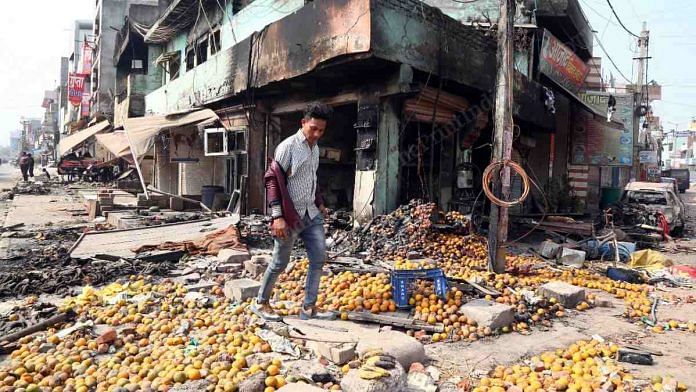New Delhi: Additional Session Judge Vinod Yadav, who repeatedly pulled up Delhi Police over its “callous” investigation into the February 2020 Northeast Delhi riots cases, has been transferred from the Karkardooma Court.
Virender Bhatt, special judge, CBI, will replace Vinod Yadav as the ASJ.
Following repeated strictures from Yadav’s court, the Delhi Police had last month finally formed six teams consisting of assistant police commissioners (ACPs) and station house officers (SHOs) of the Northeast district police stations concerned — Khajuri Khas, Gokulpuri, Karawal Nagar and Bhajanpura among others — to review the pending riot cases and ensure proper examination of evidence, through an order by the office of the Northeast DCP, Sanjay Kumar Sain.
The Delhi Police also constituted a Special Investigating Team to monitor the riot cases and for filing of the pending supplementary chargesheets.
The communal riots in Northeast Delhi in February 2020 had killed 53 people.
Also read: Delhi riots ‘didn’t take place in spur of the moment’, was ‘pre-planned conspiracy’, HC says
Pulling up cops again and again
While discharging three persons in two riot cases on 2 September, including former Aam Aadmi Party (AAP) councillor Tahir Hussain’s brother Shah Alam, judge Vinod Yadav had said that “when history will look back at the worst communal riots since the partition in Delhi, the failure of the investigating agency to conduct a proper probe, using latest scientific techniques, will surely torment the sentinels of democracy”.
The judge had also said that the “sort of investigation conducted” and the “lack of supervision” by senior officers showed that the capital’s police force had merely “tried to pull the wool over the court’s eyes and nothing else”. The judge had also been critical of investigating officers for not cooperating with the special public prosecutors.
Calling the police probe “callous”, judge Yadav had also noted the lack of “independent eyewitnesses” in both cases. The court also noted that police officers’ statements were recorded seven days and eight days after the incidents were reported, and questioned the delay.
The court had also observed that there was no CCTV footage to confirm the identity of those charged as being at the spot at the time of the incident.
In a rare move, judge Yadav had also ordered two separate trials in one FIR, in which both Hindus and Muslims have been named as accused by the police.
Judge Yadav observed that the case “has an assortment of accused” from the two religions — purportedly under two different conspiracies. This came amid the judge framing charges against three Hindus and two Muslims for a 24-year-old man’s murder during the riots.
“Bearing in mind the aforesaid judicial precedent (by the Gujarat HC), this court also deems it appropriate to separate trial of the accused so that their defence may not even likely to get prejudiced,” the court ordered.
In December last year, while granting bail to a man in two separate riot cases, judge Vinod Yadav had observed that “it didn’t appeal to the senses” that the accused Muslim man “would rub shoulder to shoulder in such a surcharged atmosphere with the members of an unlawful assembly — which mainly consisted of persons from the Hindu community, and would beat a Muslim boy to death (sic)”.
“It is very obfuscatory that a Muslim boy would become part of an ‘unlawful assembly’ which mostly consisted of members of the Hindu community, the common object whereof was to cause maximum damage to the property, life, and limb(s) of the other community. So, prima facie, the applicant (Aarif) cannot be said to be part of ‘unlawful assembly’ or share ‘common object’ with them on the date of the incident,” Yadav had noted.
(Edited by Shreyas Sharma)
Also read: Muslims have to constantly offer ‘proof of patriotism’. Delhi riots just amplified the extent



